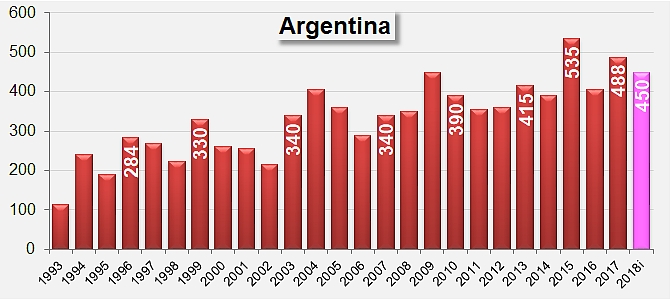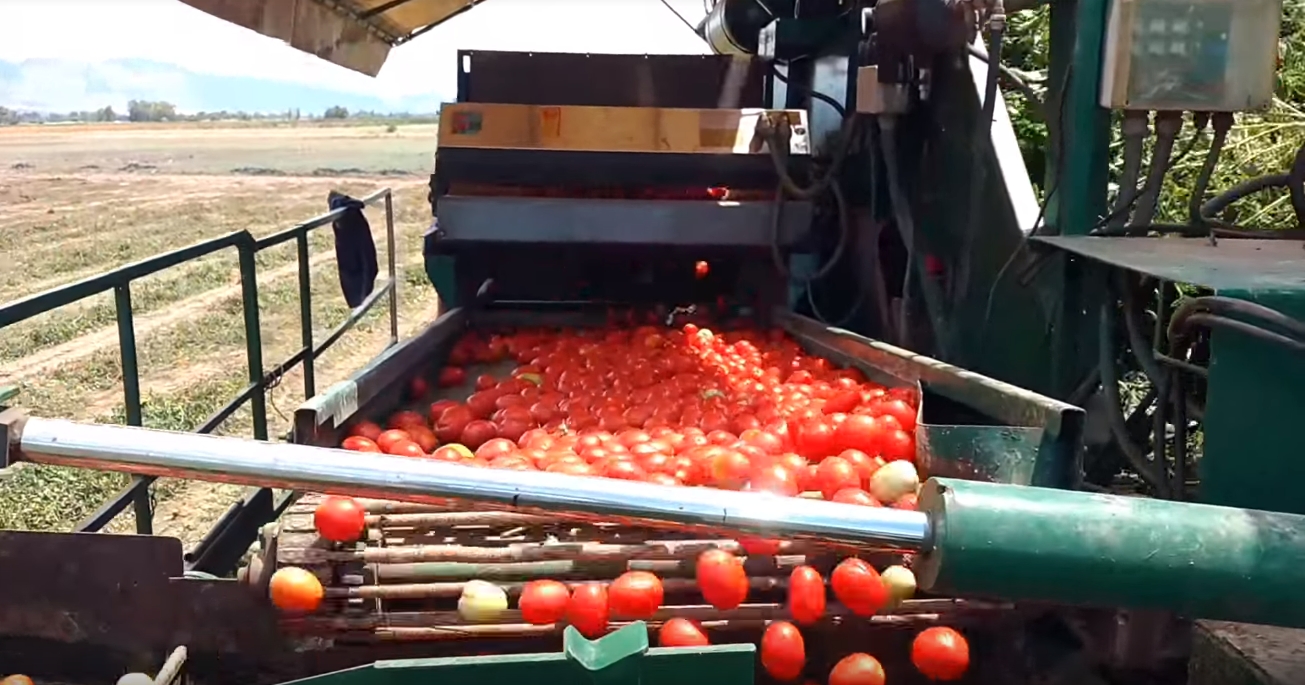2018 processing prospects amount to 450 000 tonnes
The Argentine tomato processing industry is attempting to improve the way it runs its processing season. Tomato growers, particularly in the regions of Mendoza and San Juan, are hoping to achieve higher agricultural production yields in order to increase their competitiveness in the face of "the threat of foreign processing interests". In the long term, the main target remains self-sufficiency. But in the short term, it is necessary to find a way of providing growers with easier access to financial resources.
Indeed, national production remains well below the level of demand, and the shortfall is covered by imports. Annual consumption in Argentina is estimated at 650 000 tonnes in farm weight equivalent. Over an average tomato season, the country's harvest produces 450 000 tonnes, which is approximately 40% lower than required to cover demand. "Two or three years ago, we were getting close to self-sufficiency, but tomato pastes from Chile continued to enter the country and national production has dropped," explained Rodolfo Bianchetti (Solvencia SA), Vice-President of the Tomate 2000 association, an organization that includes processors, nursery operators and growers of the tomato industry.

As mentioned last December by Cosme Argerich, the national coordinator of INTA horticultural industry operators, the start of the harvest did not occur in the best of conditions, with hail destroying 300 hectares in the San Juan region and 100 hectares in Mendoza. These two regions, which have both planted 2 000 hectares of tomatoes for processing, account for 52% of the country's total acreage for this crop, which stands at 6 100 hectares for the 2018 season, "a figure that is similar to previous years", pointed out the INTA researcher. The industry is nonetheless hoping to run a normal season in terms of quantity and quality, with these surfaces more or less matching the "6% of the crop as a whole that we consider could be affected by hail," explained Rodolfo Bianchetti.
Rising costs and an increase in the need for financing
It is generally estimated that an Argentinian tomato grower needs to have access to working funds of approximately ARS 110 000 (about USD 5 400 or EUR 4 400) per hectare and, in order to be profitable, the same surface must produce at least 100 tonnes of tomatoes. Such levels of investment virtually guarantee high yields, but also require the implementation of technological resources.
Currently, the processing industry funds between 30% and 40% of the costs that must be covered by growers. The remaining finance – approximately ARS 70 000 per hectare – must be found by the grower, which is one of the main problems for the smaller producers who often do not have access to credit lines. "Processing companies supply the seeds, finance the purchase of fertilizers and other inputs and pay an advance on the harvest price," explained one grower, "but without aid from the state or from financial institutions, it is very difficult to obtain bank loans. A lot of growers do not even use a bank account."
This issue has not escaped the attention of the Vice-President of the Tomate 2000 association, who regrets that despite all the efforts invested in technology transfer and advisory services for associated growers, the difficulties they encounter in accessing financial resources have delayed the implementation of the skills acquired and slowed the growth of agricultural yields.
 This year, the Tomate 2000 association hopes to harvest 450 000 tonnes.
This year, the Tomate 2000 association hopes to harvest 450 000 tonnes.
As for the question of weather hazards, the Association has developed its own compensation fund, which is fed by contributions from associated operators, in order to cover the costs of any growers who are affected. In the case of the exceptional hailstorms that devastated some 400 hectares in San Juan and Lavalle halfway through the season, the fields were insured by this fund, so all of the expenses incurred by affected growers have been compensated.
"With this compensation fund, we have managed to break free from state dependency [for this aspect of the business], but it is still not sufficient. We are currently engaged in positive dialogue with provincial and national government authorities, but [...] we still require financing for growers. The industry has its own problems and cannot cover all the financial requirements," explained one of the Tomate 2000 growers.
Objective: to maintain the previous performance
Given the increased competition from abroad, local production must find ways of reducing costs in order to remain competitive. "The Tomate 2000 association is trying to reinforce this sector so that foreign processors do not bury us. This is our challenge, but the fact remains that financing is essential for growers," added Mr. Bianchetti.
Tomato paste remains "a global commodity", stated the Vice-President of Tomate 2000, and its price is fixed at the worldwide level. In this typical market scenario, Argentinian growers are at a real disadvantage. Imports of Chilean tomato paste are replacing local production and threatening the development of the industry. "These trade flows have existed for a long time, particularly in order to cover requirements in years of shortfall, but today the situation is different, and it has become cheaper to import pastes from Chile then to grow and process here," concluded Mr. Bianchetti.
Sources: losandes.com.ar
Some complementary data
A video is available on YouTube:
https://www.youtube.com/watch?v=G7uoiEaPV































